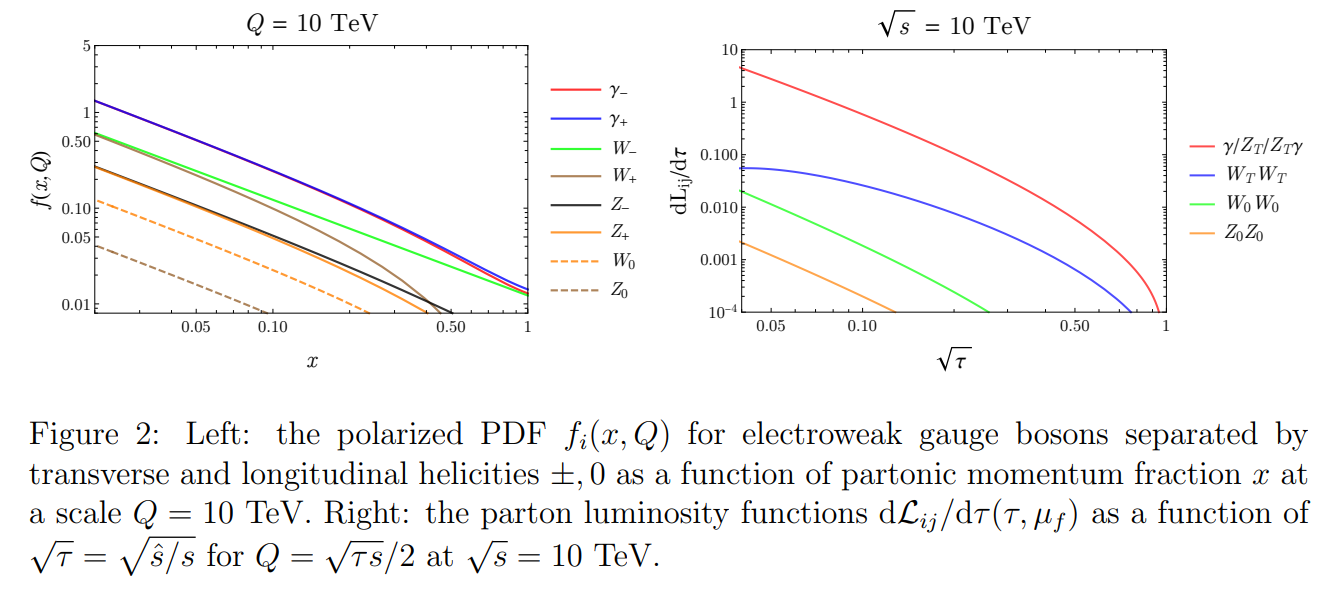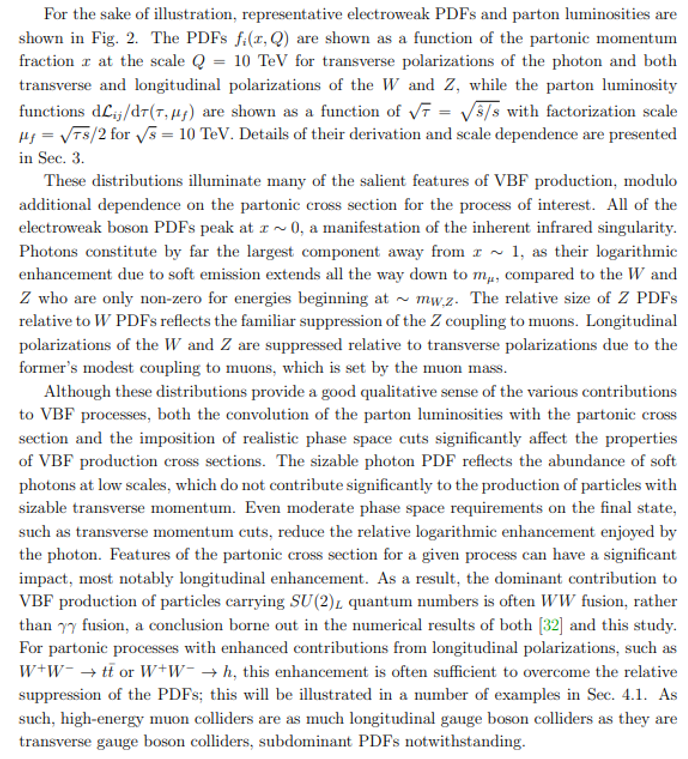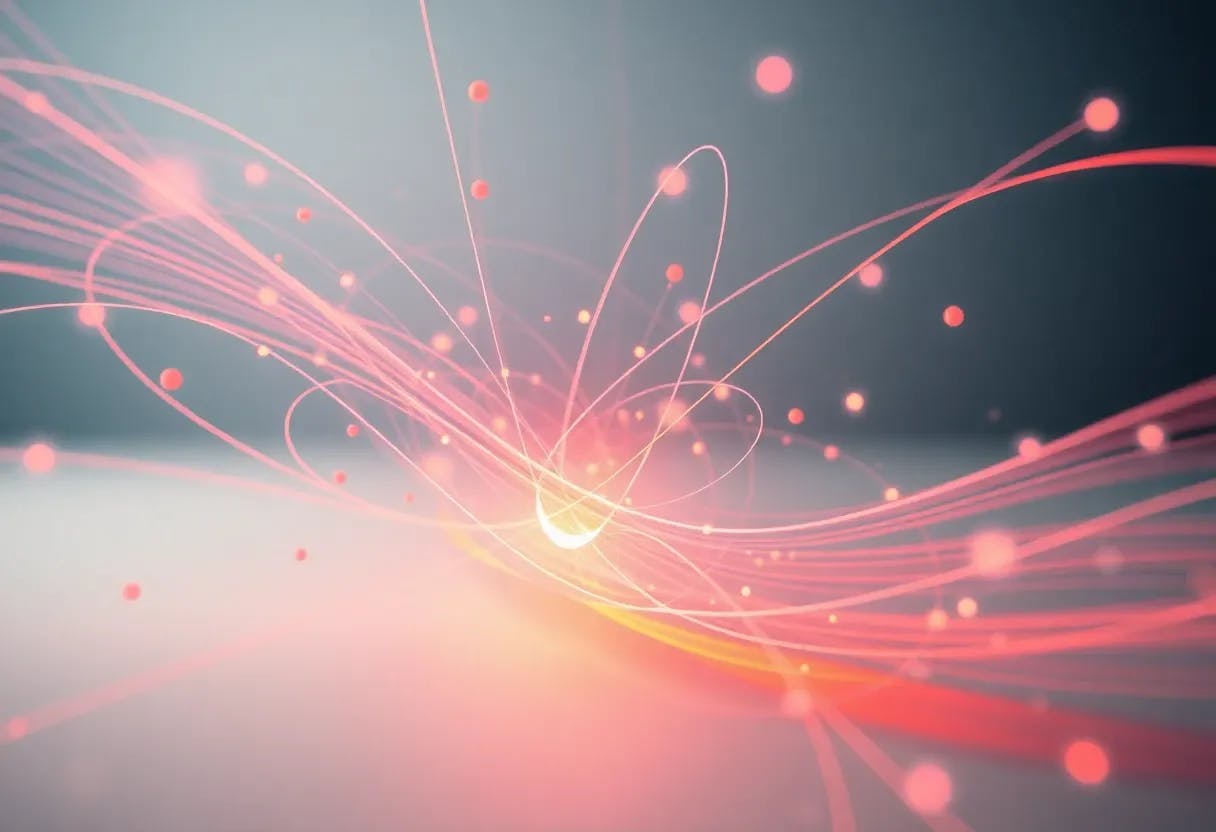Table of Links
2 Muons vs. Protons
3 Muon Colliders Are Gauge Boson Colliders
3.1 From the effective vector approximation to PDFs
3.2 PDFs with broken electroweak symmetry
4 Physics
4.1 Electroweak symmetry breaking
5 Complementarity
6 Summary and Future Directions
2.2 Vector boson fusion
For collisions well above the production threshold, the virtual electroweak gauge boson content of high-energy muon beams becomes increasingly relevant, akin to the virtual gluon content of high-energy proton beams. VBF becomes a correspondingly important channel for the production of SM and BSM particles alike, with cross sections typically scaling with c.m. energy as ∼ log(s) far above threshold. The practical aspects of VBF at high-energy muon colliders have recently been studied in detail in [32], while the treatment of VBF in terms of electroweak parton distribution functions (PDFs) has been initiated in [25]. Here we summarize the qualitative features of VBF production, reserving a detailed discussion of electroweak PDFs for Sec. 3.


Authors:
(1) Hind Al Ali, Department of Physics, University of California, Santa Barbara, CA 93106, USA;
(2) Nima Arkani-Hamed, School of Natural Sciences, Institute for Advanced Study, Princeton, NJ, 08540, USA;
(3) Ian Banta, Department of Physics, University of California, Santa Barbara, CA 93106, USA;
(4) Sean Benevedes, Department of Physics, University of California, Santa Barbara, CA 93106, USA;
(5) Dario Buttazzo, INFN, Sezione di Pisa, Largo Bruno Pontecorvo 3, I-56127 Pisa, Italy;
(6) Tianji Cai, Department of Physics, University of California, Santa Barbara, CA 93106, USA;
(7) Junyi Cheng, Department of Physics, University of California, Santa Barbara, CA 93106, USA;
(8) Timothy Cohen, Institute for Fundamental Science, University of Oregon, Eugene, OR 97403, USA;
(9) Nathaniel Craig, Department of Physics, University of California, Santa Barbara, CA 93106, USA;
(10) Majid Ekhterachian, Maryland Center for Fundamental Physics, University of Maryland, College Park, MD 20742, USA;
(11) JiJi Fan, Department of Physics, Brown University, Providence, RI 02912, USA;
(12) Matthew Forslund, C. N. Yang Institute for Theoretical Physics, Stony Brook University, Stony Brook, NY 11794, USA;
(13) Isabel Garcia Garcia, Kavli Institute for Theoretical Physics, University of California, Santa Barbara, CA 93106, USA;
(14) Samuel Homiller, Department of Physics, Harvard University, Cambridge, MA 02138, USA;
(15) Seth Koren, Department of Physics and Enrico Fermi Institute, University of Chicago, Chicago, IL 60637, USA;
(16) Giacomo Koszegi, Department of Physics, University of California, Santa Barbara, CA 93106, USA;
(17) Zhen Liu, Maryland Center for Fundamental Physics, University of Maryland, College Park, MD 20742, USA and School of Physics and Astronomy, University of Minnesota, Minneapolis, MN 55455, USA;
(18) Qianshu Lu, Department of Physics, Harvard University, Cambridge, MA 02138, USA;
(19) Kun-Feng Lyu, Department of Physics, The Hong Kong University of Science and Technology, Clear Water Bay, Kowloon, Hong Kong S.A.R., P.R.C;
(20) Alberto Mariotti, Theoretische Natuurkunde and IIHE/ELEM, Vrije Universiteit Brussel, and International Solvay Institutes, Pleinlaan 2, B-1050 Brussels, Belgium;
(21) Amara McCune, Department of Physics, University of California, Santa Barbara, CA 93106, USA;
(22) Patrick Meade, C. N. Yang Institute for Theoretical Physics, Stony Brook University, Stony Brook, NY 11794, USA;
(23) Isobel Ojalvo, Princeton University, Princeton, NJ 08540, USA;
(24) Umut Oktem, Department of Physics, University of California, Santa Barbara, CA 93106, USA;
(25) Diego Redigolo, CERN, Theoretical Physics Department, Geneva, Switzerland and INFN Sezione di Firenze, Via G. Sansone 1, I-50019 Sesto Fiorentino, Italy;
(26) Matthew Reece, Department of Physics, Harvard University, Cambridge, MA 02138, USA;
(27) Filippo Sala, LPTHE, CNRS & Sorbonne Universite, 4 Place Jussieu, F-75252 Paris, France
(28) Raman Sundrum, Maryland Center for Fundamental Physics, University of Maryland, College Park, MD 20742, USA;
(29) Dave Sutherland, INFN Sezione di Trieste, via Bonomea 265, 34136 Trieste, Italy;
(30) Andrea Tesi, INFN Sezione di Firenze, Via G. Sansone 1, I-50019 Sesto Fiorentino, Italy and Department of Physics and Astronomy, University of Florence, Italy;
(31) Timothy Trott, Department of Physics, University of California, Santa Barbara, CA 93106, USA;
(32) Chris Tully, Princeton University, Princeton, NJ 08540, USA;
(33) Lian-Tao Wang, Department of Physics and Enrico Fermi Institute, University of Chicago, Chicago, IL 60637, USA;
(34) Menghang Wang, Department of Physics, University of California, Santa Barbara, CA 93106, USA.
This paper is

